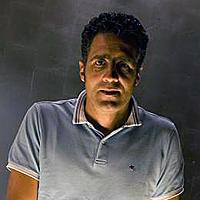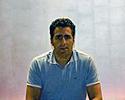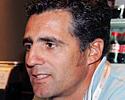
Recently on Cyclingnews.com |
An interview with Miguel Indurain, February 7 , 2008
Miguel Indurain: Impressions on Australia
Miguel Indurain was an extraordinary man on a bike, but despite all his fame, he remains the humble son of a farmer. During his illustrious career, Indurain experienced many changes, from the influx of non-European riders to the change in the structure of the racing calendar. Cyclingnews' Paul Verkuylen sat down with the gentle giant to discuss the ProTour and the impact he believes it may have on cycling.
 |
Miguel Indurain became the first rider to win five consecutive Tours de France in the 1990's, putting himself onto the list of cycling legends by dominating his rivals in the time trials and limiting his loses in the mountains. After winning the Tour from 1991-1995, he retired from professional cycling shortly after abandoning the Vuelta in 1996, which he was forced to ride by his Banesto team. Since that time, he has remained close to his roots, happily living in Pamplona, just five kilometers from his birth town of Villava.
"It was a bit difficult at first [retiring]. But since then life has been good and I am happy," he explained.
Indurain has taken a less pronounced role in his retirement than other living legends like Eddy Merckx and Bernard Hinault, preferring to lead a quiet, simple life running a sporting goods store in his home town while putting time into furthering the sport. On top of working in the ProTour commission for the UCI, he also writes for Marca, one of Spain's leading newspapers, as well as making time to ride his bike on occasion. "But only during the summer, a couple of times a week," he stressed.
During his decade in the peloton, Indurain saw plenty of changes in the professional cycling. He witnessed the rise of the UCI's World Cup, which replaced the old Super Prestige series in 1989. At one stage of his career, Indurain was able to use the Vuelta as preparation for the Tour de France, before it was moved from the spring to its current time slot in late summer. Since his retirement in 1996, Indurain has remained active in the sport, and was in Australia in January to witness the first step in the UCI's attempt at globalising the sport: the Tour Down Under, the first ProTour event ever held outside Europe.
"These are not just a problem of today, the problems started a long time ago."- Indurain talks about the difficulties the ProTour has encountered during its development. |
Indurain believes that countries outside Europe have a place on the calendar alongside the more traditional countries of France, Italy, Spain, Belgium and Holland. "I think that cycling has to change, so I am a supporter of the globalisation of cycling," he said. "It is not easy to say what exactly needs to be changed because it is still just the start of the change, but I think that there are a lot of things that need to be done."
'Big Mig' never had a chance to race in the Australian or American races which emerged on the calendar since his retirement, but he supports the addition of the Tour Down Under to the professional calendar for the riders as well as the fans. "Cycling is growing, so I think that it is important that cycling is also accessible to those nations," he said.
 |
While the UCI's ProTour has encountered plenty of difficulties during its development over the past four years, Indurain said that the problems are by no means new to the sport, but stem from resistance to change. "These are not just a problem of today, the problems started a long time ago," he explained.
"It is normal that there are some problems because there are interests from some of the people involved to keep everything the same as it has been, and for the same token it is in the interest for others to implement changes, so it is not easy.
"It is difficult because there is also personal interest involved. They need to work together in order to understand what is the best for cycling."
Impressions of Australia
 |
Indurain was presented with the opportunity to travel the Tour Down Under and experience first-hand the impact that the ProTour has had on cycling in Australia. He was a special guest of the race for the duration but arriving shortly before Christmas, he spent a considerable amount of time traveling the country with his family before the start of the race on January 20. "First we spent a week in Adelaide, then we hired a car and with my family I have visited a lot of South Australia - Victor Harbor, Kangaroo Island, the Barossa Valley – I have visited a lot of places.
"I can't put my finger on the most amazing place. I have been impressed by everything; each place has been different to the next. Adelaide is a nice city, we loved Kangaroo Island for its nature and relaxed attitude, the Barossa for the wine. Everything that I have seen has been so different."
His trip to Adelaide was not the first time he has ventured to Australia; in 2000 he was invited by the Olympic committee to attend the Sydney Olympics. "I went to see the races, but it was just a short visit," he said.
Part of his visit included a trip to watch some local track racing in Adelaide, where he noted the strength that Australian cycling has achieved since he first met Phil Anderson at the Tour de France almost a quarter of a century ago..
"The way that cycling in Australia is run is very impressive. There were a lot of kids, starting from a very young age which is good to see.
"For a country that has not been known to be a big cycling nation I can see that it is developing and it will continue to grow."
The night before the final stage of the Tour, Indurain was honored by 750 guests as part of the legends dinner, which has become a fixture of the race in recent years. During the dinner, Indurain donated a Banesto jersey that was auctioned off with the proceeds going to the Amy Gillett foundation. With bidding beginning out at $1000, the value of the jersey quickly skyrocketed. Showing how popular the Spaniard is amongst his peers, the $12,000 winning bid came from another cycling legend in the form of 2007 Paris Roubaix winner and Adelaide local, Stuart O'Grady.
